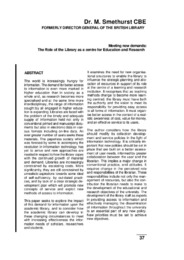Meeting new demands: the role of the library as a centre for education and research: M. Smethurst
Abstract
The world is increasingly hungry for information. The demand for better access to information is even more marked in higher education than in society as a whole and, as research becomes more specialised and at the same time more interdisciplinary, the range of information sought by all engaged in higher education is expanding. Libraries are faced with the problem of the timely and adequate supply of information held not only in conventional printed and manuscript documents but also in electronic data in various formats including on-line data. An ever greater number of users seeks these materials. The paperless society which was forecast by some to accompany the revolution in information technology has yet to arrive and new approaches are needed in respect to how the library copes with the continued growth of material and demand. Libraries are increasingly constrained by escalating costs. More significantly, they are still constrained by unrealistic aspirations towards some ideal of self-sufficiency, by out-dated practices, and by lack of a clear strategic development plan which will promote new concepts of service and exploit new methods of access to information. This paper seeks to explore the impact of this demand for information upon the academic library, and to consider how the academic library can develop in these changing circumstances to meet with increasing effectiveness the information needs of scholars, researchers and students. It examines the need for new organisational structures to enable the library to influence the strategic planning and allocation of resources in support of its role at the centre of a learning and research institution. It recognises that as teaching methods change to become more learning centred, the library must have both the authority and the vision to meet its responsibility for providing easy access to all forms of information. It must organise better access in the context of a realistic awareness of cost, value for money, and an effective service to its users. The author considers how the library should modify its collection development and service policies in the light of information technology. It is critically important that new policies should be set in place that are built on a better assessment of user needs, informed by greater collaboration between the user and the librarian. This implies a major change in conventional practice, and attitudes. It requires change in the perceived role and responsibilities of the librarian. These responsibilities include not only the management of resources, but also the contribution the librarian needs to make to the development of the educational and research objectives of the university. The development of the library staff as experts in providing access to information and effectively managing the dissemination of information throughout the university is an essential part of any new policy. New priorities must be set to achieve new objectives
